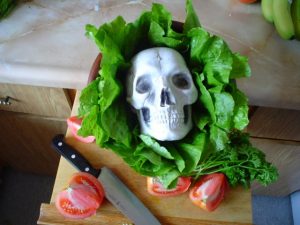Notes from a podcast by Ray Goldberg of the Harvard Business School drawn from his case study, Wegmans and Listeria: Developing a Proactive Food Safety System for Produce
The agribusiness program Goldberg developed in 1955 continues to bring business leaders and policy makers from around the world to gether each year. Throughout his tenure, Ray has written over 100 articles and 24 books on the business of agriculture, including his very latest, Food Citizenship: Food System Advocates in an Era of Distrust.
gether each year. Throughout his tenure, Ray has written over 100 articles and 24 books on the business of agriculture, including his very latest, Food Citizenship: Food System Advocates in an Era of Distrust.
He was interviewed by podcast host, Brian Kenny: Did you coin the term agribusiness?
Ray Goldberg: I did, together with John Davis. He was the Assistant Secretary of Agriculture under Eisenhower, and he became the first head of the (HBS) Agribusiness Program.
Brian Kenny: The case cites examples of foodborne illness outbreaks in the US. We’re coming on the heels of the recent romaine lettuce issue in the US, which has now occurred, I think, twice in the last few months.
Ray Goldberg: I can describe the romaine lettuce [event], because I talked to the produce manager this morning, and he tells me the cost to the industry was $100 million dollars.
The problem is that romaine lettuce itself, when cold temperatures occur, begins to blister, which make it more susceptible to listeria. When they tried to find the location of that listeria, it came from a dairy herd about 2,000 feet away from where that lettuce was grown. We have a rule that 1,200 feet is far enough, but they actually found listeria a mile away from where that lettuce was concerned, so he feels very strongly that they have to change the rules.
(They seem to be confusing Listeria with E.coli O157 in Romaine, but that’s Haaaaaaaaarvard.)
Brian Kenny: Which gets to another issue that the case raises, which is has the industry done well enough trying to regulate itself? What are some of the things the industry has tried to do?
 Ray Goldberg: Under Danny Wegman’s leadership—he was the person in charge of food safety of the Food Marketing Institute that really looked at the whole industry—he got several members of the industry to sit down and create new rules with the FDA, the EPA, the USDA, and CDC, all of them saying we have to have better rules. Produce, as you know in the case, is the most valuable part of a supermarket but also the most susceptible to problems.
Ray Goldberg: Under Danny Wegman’s leadership—he was the person in charge of food safety of the Food Marketing Institute that really looked at the whole industry—he got several members of the industry to sit down and create new rules with the FDA, the EPA, the USDA, and CDC, all of them saying we have to have better rules. Produce, as you know in the case, is the most valuable part of a supermarket but also the most susceptible to problems.
Brian Kenny: This gets a little bit to the topic of your book, Food System Advocates in an Era of Distrust. [What[ are the big ideas coming out of your book?
Ray Goldberg: The big ideas are two-fold, that the kind of men and women in the industry have changed from commodity handlers and bargaining as to how cheap they can buy something, or how expensive they can make something, to finally realizing that they have to be trusted. And because they have to be trusted, they have to start working together to create that trust. In addition to that, they realize that the private, public and not-for-profit sectors really need to work together. That’s why I tried to write a book to give people an inkling of the kind of men and women in this industry who really are the change-makers, who are changing it to a consumer-oriented, health-oriented, environmentally-oriented, economic development-oriented industry.
